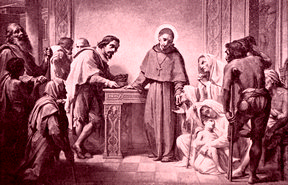Lives of the Saints
Our Models and Protectors
Spiritual Bouquet:
September 22

Saint Thomas of Villanova
Bishop of Valencia
(1488-1555)
Saint Thomas, the glory of the Spanish Church in the sixteenth century, was born in the diocese of Toledo in 1488. His mother was a Christian of extraordinary tenderness for the poor. God worked a miracle for her one day, when her servants had given away absolutely all the flour in their storeroom. When another beggar came to the door, she told them to go back once more and look again, and they found the storeroom filled with flour. Her little son followed his mother's example, and one day gave away, to six poor persons in succession, the six young chicks which had been following the hen around in the yard. When his mother asked where they were, he said, You didn't leave any bread in the house, Mama, so I gave them the chicks! I would have given the hen if another beggar had come.
At the age of fifteen years he began his studies and succeeded so well he was judged fit to teach philosophy and theology in a college of Alcala, and then at Salamanca. When his father died he returned to Villanova to dispose of his patrimony. He made his house into a hospital, keeping only what was needed for his mother, and gave the rest to the poor. At the age of twenty-eight he entered the Order of the Hermits of Saint Augustine at Salamanca, becoming professed in 1517.
When ordained a priest three years later, he continued his teaching of theology, but also began to preach so remarkably well that he was compared with Saint Paul and the prophet Elias. The city was reformed, and after the Emperor Charles V heard him once, he returned and often mingled with the crowd to listen, finally making Saint Thomas his official preacher.
He became Prior of his Order in three cities, then three times a Provincial Superior. His sanctity continued to increase, and he was nominated archbishop of Valencia in 1544; he had refused a similar offer sixteen years earlier, but this time was obliged to accept. After a long drought, rain fell on the day he assumed his new office. He arrived as a pilgrim accompanied by one fellow monk, and was not recognized in the convent of his Order when the two travelers came asking for shelter during the rain. He was obliged to reveal his identity when the Prior, who wondered where the awaited archbishop might be, asked him if perchance it was he.
The new Archbishop was so poor that he was given money for furnishings, but he took it to the hospital for the indigent. On being led to his throne in church, he pushed the silken cushions aside, and with tears kissed the ground. His first visit was to the prison. Two-thirds of his episcopal revenues were annually spent in alms. He daily fed five hundred needy persons, made himself responsible for the bringing up of the city's orphans, and sheltered neglected foundlings with a mother's care. During his eleven years' episcopate, not one poor maiden was married without an alms from the archbishop. Spurred by his example, the rich and the selfish became liberal and generous. And when, on the Nativity of Our Lady, 1555, after one week of illness, Saint Thomas was about to breathe his last, he gave his bed to a poor man and asked to be placed on the floor. It has been said that at his death he was probably the only poor man in his see.
Reflection: When a refractory priest had not heeded his bishop's remonstrances, Saint Thomas took him into a room apart, uncovered his shoulders and knelt before his crucifix, saying: My brother, my sins are the reason you have not changed your life and listened to my warnings. It is just for me to bear the penalty of my fault. And he scourged himself cruelly. This frequent practice brought many to tears and reform of their lives. In this way a perfect Pastor inspired his entire flock with truly Christian sentiments.
Les Petits Bollandistes: Vies des Saints, by Msgr. Paul Guérin (Bloud et Barral: Paris, 1882), Vol. 11